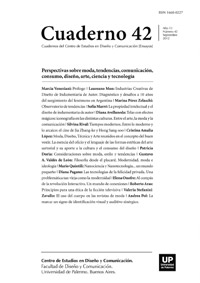Las tecnologías de la felicidad privada. Una problemática tan vieja como la modernidad
Abstract
No technology is neutral and what seems to lie ahead are different ways of representing the world and constituting subjectivity.
While cyberspace has penetrated across social classes and age ranges, it is natural that young
people who are more comfortable and perhaps less critical of the possibilities that new technologies promote but also encroach. Are we facing a revolution which established a new era crossed by virtuality or we face a deepening, a new phase of a process that takes as few centuries? We participate, rather than in a break with modernity in a deepening individual-capitalist paradigm.This postmodern, carries up to a paroxysm the idea of happiness away from the public
and the common good. Interpersonal relationships and participation as a part of a social group
are not valued, forgetting the key role they play in the formation of subjectivity. Private happiness is a happiness that penetrated by new technologies appears to be a sharing with others
and yet consumption is strictly individual. And herein lies the novelty for all this occurs in the
context of the emergence of a new phenomenon that is embodied in breaking the social bonds
that previously contained individuals in direct interpersonal relationships.
References
Bleger. J. (1967). Simbiosis y ambigüedad. Argentina: Paidós.
Bradbury, R. (2006). Fahrenheit 451 (1953). Buenos Aires: Sudamericana.
Braidotti, R. (2000). Sujetos nómades (1994). Buenos Aires: Paidós.
Castell, M. (2000). La era de la información. El poder de la identidad. México: Siglo XXI.
Castoriadis, C. (1997). El avance de la insignificancia. Buenos Aires: EUDEBA y Secretaría de
Relaciones Universitarias de UBA.
Dolto, F. (1990). La causa de los adolescentes. Barcelona: Seix Barral.
Freud, S. (2007). El malestar en la cultura y otras obras (1930). Buenos Aires: Amorrortu.
Foucault, M. (1976). Vigilar y castigar. México: Siglo XXI.
Foucault, M. (1998). Las palabras y las cosas. Buenos Aires: Siglo XXI.
Hazaki, C. (2010). El cuerpo mediático. Buenos Aires: Paidós.
Huxley, A. (1985). Un mundo feliz (1932). México: Editores Mexicanos Unidos.
Lipovetsky, G. (1987). El imperio de lo efímero: la moda y su destino en las sociedades modernas,
Barcelona: Anagrama.
(1986). La era del vacío. Ensayo sobre el individualismo contemporáneo. Barcelona: Anagrama.
McLuhan, M. (1969). La galaxia Gutenberg. Génesis del homo typographicus. Madrid: Aguilar.
Ong, W. (2006). Oralidad y escritura, Tecnologías de la palabra. México: FCE.
Orwell, G. (2007). 1984 (1949). Buenos Aires: Planeta.
Palma, D. (2010). Borges.com. La ficción de la filosofía, la política y los medios. Buenos Aires: Biblos.
Prost, A. (1991). Fronteras y espacios de lo privado. La vida privada en el Siglo XX. Buenos Aires:
Taurus.
Sennett, R. (1978). El declive del hombre público. Barcelona: Península.
Sibilia, P. (2008). La intimidad como espectáculo. Buenos Aires: FCE.
(2005). El hombre postorgánico. Cuerpo, subjetividad y tecnologías digitales. Buenos Aires: FCE.
Tort, M. (2008). Fin del dogma paterno. Buenos Aires: Paidós.
Viereck, G. S. (1957) Psychoanalysis and the Fut. New York Journal of Psychology. Entrevista
traducida del inglés al castellano por Miguel Ángel Arce.
Los autores/as que publiquen en esta revista ceden los derechos de autor y de publicación a "Cuadernos del Centro de Estudios de Diseño y Comunicación", Aceptando el registro de su trabajo bajo una licencia de atribución de Creative Commons, que permite a terceros utilizar lo publicado siempre que de el crédito pertinente a los autores y a esta revista.


